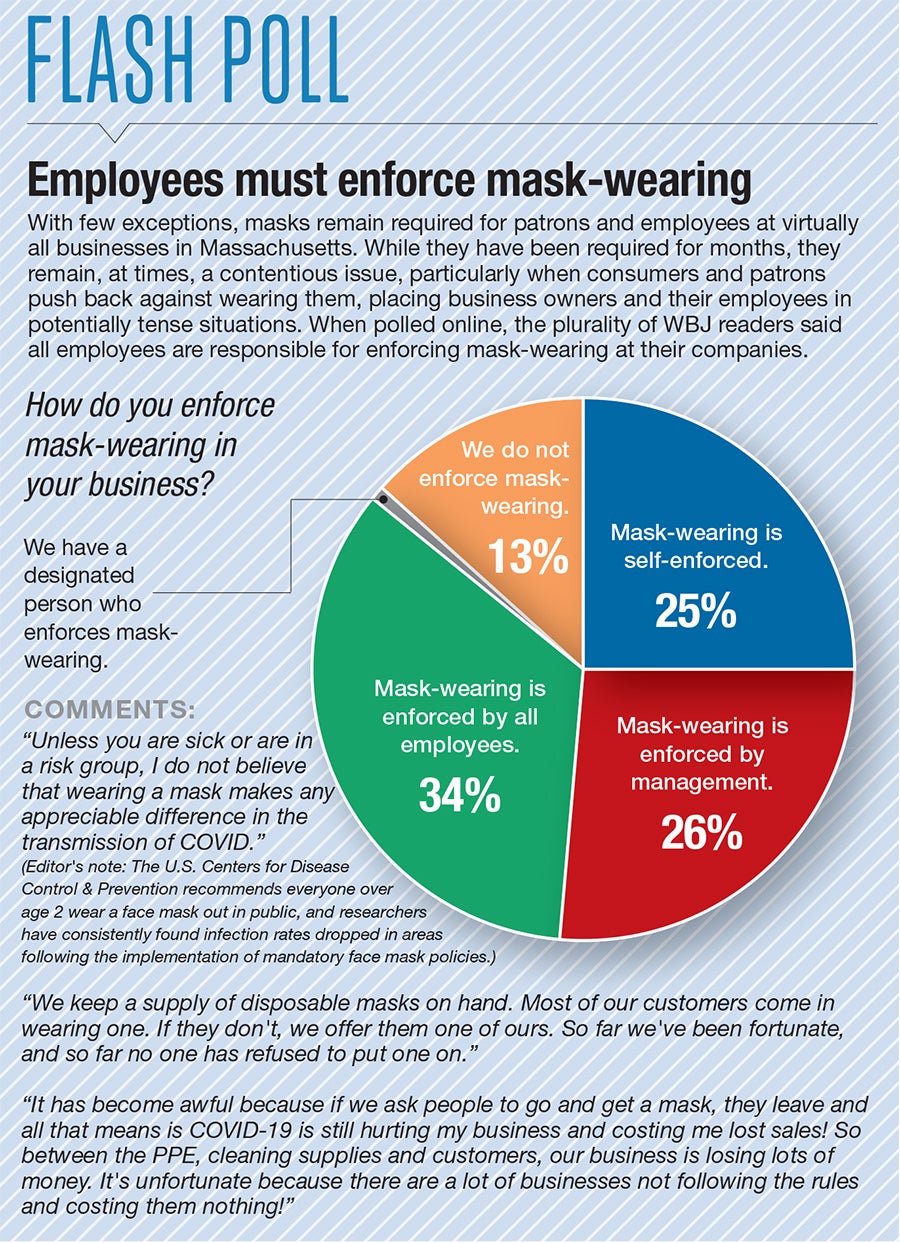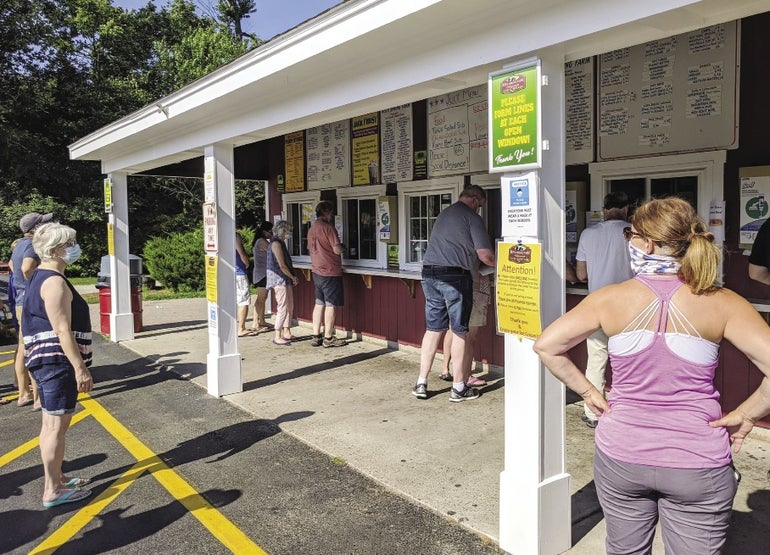The coronavirus pandemic has forced Central Massachusetts business to take on new roles in preventing further spread of the disease, including enforcing mask-wearing in public and – at times – turning away would-be revenue-generating customers who don’t abide by the mandate.
Get Instant Access to This Article
Subscribe to Worcester Business Journal and get immediate access to all of our subscriber-only content and much more.
- Critical Central Massachusetts business news updated daily.
- Immediate access to all subscriber-only content on our website.
- Bi-weekly print or digital editions of our award-winning publication.
- Special bonus issues like the WBJ Book of Lists.
- Exclusive ticket prize draws for our in-person events.
Click here to purchase a paywall bypass link for this article.
The coronavirus pandemic has forced Central Massachusetts business to take on new roles in preventing further spread of the disease, including enforcing mask-wearing in public and – at times – turning away would-be revenue-generating customers who don’t abide by the mandate.
Throughout July and heading into August, the U.S was reporting a record number of coronavirus cases, largely in states who initially had lax social distancing requirements and face mask policies. Massachusetts, though, has kept its case count and death toll low since its initial surge in April and May, largely due to strict health regulations like a statewide face mask mandate, and has moved into the third of four phases in reopening its economy.
In order to do their part to keep the economy open and avoid another pandemic-related shutdown, Central Massachusetts businesses said their customers and employees are largely abiding by their safety measures, although there are a few bad apples and the impact on revenue and expenses remains significant.
“Quite frequently we get customers who do not want to wear a mask,” said Erica Grinkis, owner of the Gazbar Sports Grill in Leominster. “They tell us that it is not a law and that they should not have to wear it. We are forced to turn customers away who refuse to wear a mask. We have had to ask people to leave after asking them to put a mask on multiple times when they get up from their table.”

Enforcing the rules
Restaurants, which can now offer indoor and outdoor dining after being limited to take-out and delivery during the shutdown, have to enforce regulations with guests and employees. Grinkis said she needs to protect immunocompromised employees and guests. Sanitizing stations have been included at the restaurant.
If a Gazbar employee wants to come back after being sick they must take a coronavirus test and prove with documentation they have tested negative for the virus.
“We have masks available to purchase in the event that a customer doesn't have one,” Grinkis said. “We also have to watch customers and make sure that they are putting their mask back on any time they get up from their table. As always, if a staff member is feeling sick, they are not to come into work.”
Mike Covino, the owner of Niche Hospitality Group in Worcester – including The Fix Burger Bar and Mezcal Tequila Cantina, both in Worcester – reiterates the rules are all about protecting employees and customers
“The restaurants' staff workers wear masks throughout their shift,” Covino said during a July webinar hosted by Worcester Business Journal. “Employees were given the option of not yet returning to work if they weren't comfortable with it.”
Employees undergo temperature checks at the start of every shift, and Niche spent what Covino described as a fortune on disinfectants. Niche customers have largely been understanding of the face mask requirement, he said.
“It’s a state mandate. It’s not a Mike Covino mandate. I think it’s pretty easy when it comes to that,” he said. “We make a charitable assumption that they forgot it.”
Crust Artisan Bakeshop in Worcester is still limiting customers to takeout and enforcing social distancing due to the small size of the dining inside the business.
“We’re still not allowing customers to come into our space,” Owner Alexis Kelleher said. “We have a table at the front door, and it’s still just staff who are the only ones allowed to come in. We have people taking their orders either at the door, over the phone, or online, and then they can pick up their to-go bag at the front door.”
Investing in protections
Families Together Adult Day Health Center in Leicester, which is a care center for disabled adults and seniors, has higher restrictions, which forced CEO and Founder Daniel Estevez to invest in new personal protective equipment to protect clients, and follow more precautions and restrictions than restaurants or other businesses.
“We made a number of upgrades that were super costly to us,” Estevez said. “Including having, at least a minimum, two-week supply of PPE equipment such as face masks, gloves, gowns, protective eyewear for personal care, as well as adding additional rooms to our facility to accommodate symptomatic clients, and new furniture to accommodate the sanitation needs, sanitation materials, and supplies, with at least a two week minimum. The list goes on.”
Estevez has increased daily testing and followed safety precautions to ensure a safe environment for employees and clients.
“We are mandated to have our staff and clients checked everyday for fevers and symptoms of COVID-19 before they step into the building,” Estevez said. “That is done every single day. The more familiar sets of rules, you're probably familiar with, obviously no one can come in without a mask, the social distancing is being applied, as well, at all times, as much as possible.”
Even businesses who aren’t customer-based have adjusted their workplaces in similar ways. Betsy Landry, the director of human resources at Worcester law firm Mirick O’Connell, said these precautions include monitoring the temperatures of employees and frequent deep cleanings.
“We have signage throughout the office on safety and hygiene protocols; and we maintain cleaning and contact tracing logs and monitor office capacity,” Landry said.
Landry said meeting with clients now includes new technological innovations, such as Zoom meetings and coronavirus resources on the law firm’s internal intranet accessible to employees.
“We are partnering with our clients to ensure we are meeting their expectations while keeping them and our employees safe,” Landry said.
At Gazbar, Grinkis has moved chairs and tables to fit social distance requirements for guests. Grinkis has automated messages sent out to guests, to replace the potential dangers of individuals waiting for a table together at the restaurant.
“We have moved all tables both indoors and outdoors six feet apart,” Grinkis said, “which eliminated a few tables that we normally have in rotation. We now only have a maximum of six chairs at a table and they cannot be moved. We are not allowed to have the bar stools at the bar anymore, so we have tables attached to the bar that are also six feet apart.”
Bringing in less money
As his restaurants opened back up, Covino estimated his Niche eateries to be generating 30% and 50% of their typical revenue, hampered by a lack of bar business.
The reduction is similar at Families Together Adult Day Health Center, which reduced capacity by almost 50% to satisfy safety guidelines.
“The biggest impact is the reduction and capacity, and that's going to stay in place until the state feels it is safe enough to increase the capacity,” Estevez said.
Even with the reduction in size, Estevez emphasized the importance of adaptability within the complex and challenging times. Outdoor dining is now available at the day care center.
“Though we were negatively impacted, we are much different than other businesses and what they’re doing,” Estevez said. “We made our facility in a way that we are still able to take care of our clients in a safe way.”
Despite the challenges 2020 has brought, Kelleher said she is striving to have her business survive the pandemic and find success on the other side.
“Everyday we are just really grateful, that we are still able to be in business, we’re able to still keep our team on payroll,” Kelleher said. “It's really just one day at a time.”

